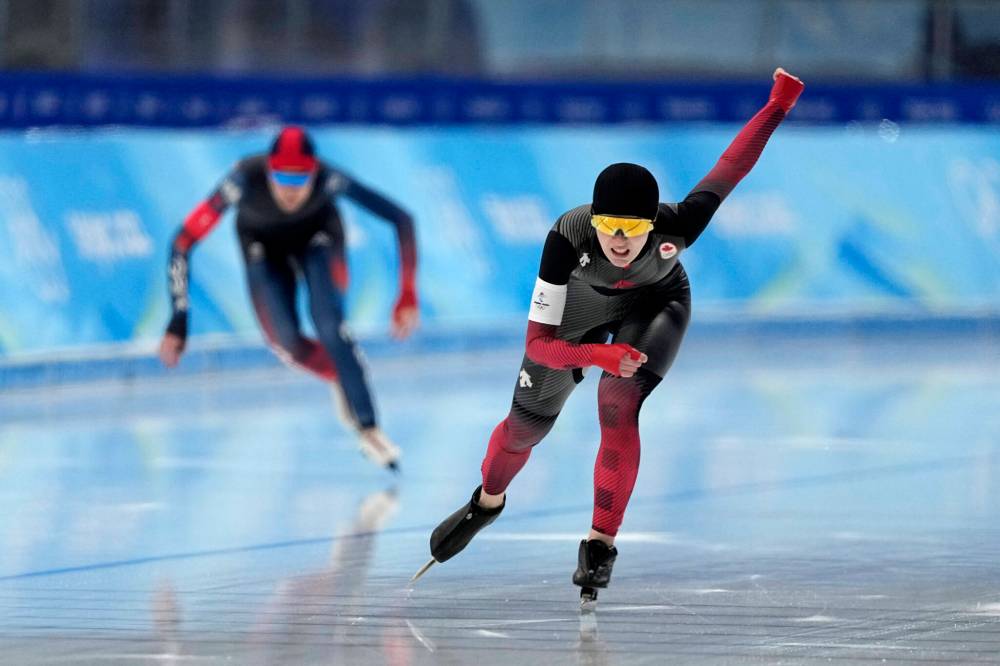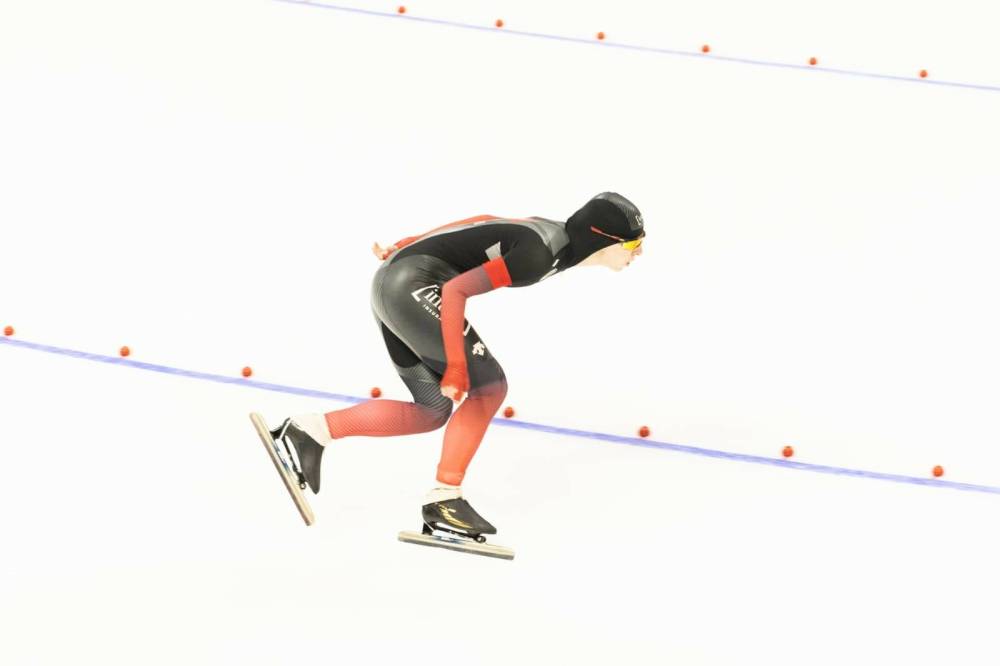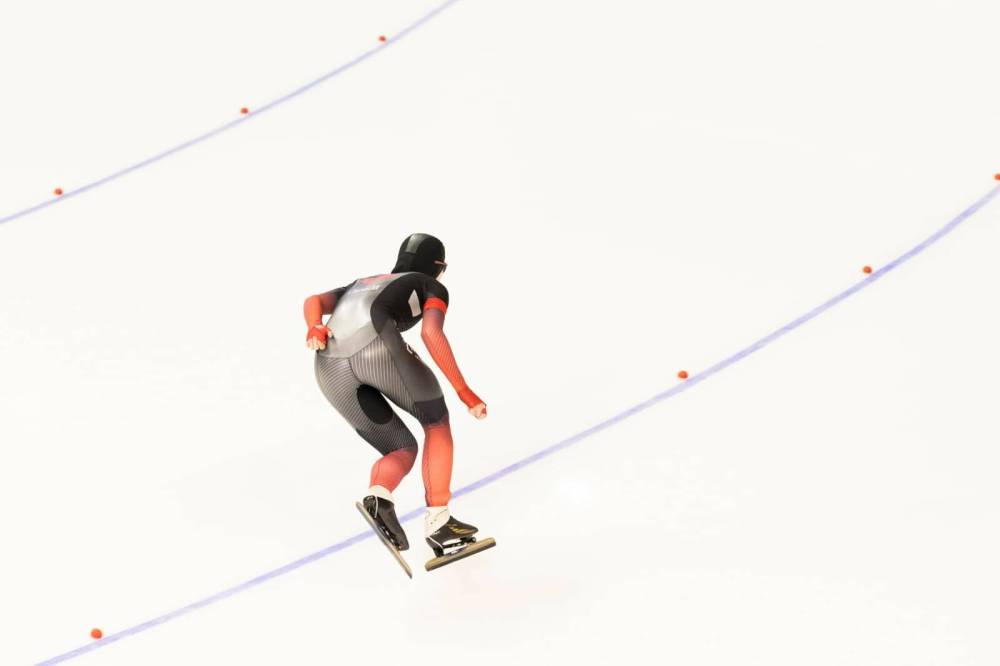Optimizing her potential
Oly speedskater Scott adjusts to life after games
Advertisement
Read this article for free:
or
Already have an account? Log in here »
To continue reading, please subscribe:
Monthly Digital Subscription
$1 per week for 24 weeks*
- Enjoy unlimited reading on winnipegfreepress.com
- Read the E-Edition, our digital replica newspaper
- Access News Break, our award-winning app
- Play interactive puzzles
*Billed as $4.00 plus GST every four weeks. After 24 weeks, price increases to the regular rate of $19.95 plus GST every four weeks. Offer available to new and qualified returning subscribers only. Cancel any time.
Monthly Digital Subscription
$4.99/week*
- Enjoy unlimited reading on winnipegfreepress.com
- Read the E-Edition, our digital replica newspaper
- Access News Break, our award-winning app
- Play interactive puzzles
*Billed as $19.95 plus GST every four weeks. Cancel any time.
To continue reading, please subscribe:
Add Free Press access to your Brandon Sun subscription for only an additional
$1 for the first 4 weeks*
*Your next subscription payment will increase by $1.00 and you will be charged $16.99 plus GST for four weeks. After four weeks, your payment will increase to $23.99 plus GST every four weeks.
Read unlimited articles for free today:
or
Already have an account? Log in here »
Hey there, time traveller!
This article was published 04/08/2022 (1283 days ago), so information in it may no longer be current.
Alexa Scott is still shaken by the feeling.
It’s been nearly six months since the 21-year-old Canadian speedskater returned from her first Olympic games in Beijing, an event she delightfully described as more of an experience than a daily grind like some other international events.
While cautiously treading through the country’s strict COVID-19 protocols, Scott said she enjoyed a balanced schedule that prepared her for competition while still having time to cheer on her fellow Canadian athletes.

ASHLEY LANDIS / ASSOCIATED PRESS FILES
Manitoba speedskater Alexa Scott finished in 12th place in the women’s 1,000-metre race at the Beijing Winter Olympics.
The Clandeboye native placed 12th in the women’s 1,000-metre event, finishing one second off the podium. It was her best finish at an international event, leaving her satisfied with her effort abroad.
“I felt like I had optimal competition prep and I raced really well in the 1,000 (metre) so I was quite happy with that,” Scott told the Free Press Thursday.
Scott was also an alternate for the team pursuit event, but didn’t race.
The three-week trip was a culmination of years of practice for the then 20-year-old, who has been speedskating since she was nine, after crossing-over from figure skating. Even more so, she explained, it was the pinnacle of the prep that began six months leading up to the Olympics, in which many athletes are “in their own funk” of six-hour training days, paying no mind to anything outside their sport and idling in stressful anticipation of the Games.
“No matter how hard you try to tell yourself that you’re not stressed about it, you’re stressed about it,” she said.
It’s an isolating time for many athletes, none more than those who trained throughout the pandemic.
When Scott got home, a new reality set in — one that happens to many competitors after the Olympic Games, she said. It’s a phenomenon she called the “post-Olympic blues.”
The blues hit Scott while she tried decompressing from her busy schedule.

ERIC ORLOWSKY PHOTO
Alexa Scott competed in her first Olympic games this February in Beijing, finishing 12th in 1000 meter speed skating. Scott said it’s common for athletes to feel what they call the “post-Olympic blues” for months after the international event ends.
“You kind of feel like everything you’ve worked up to is done and then you’re kind of sitting there with all these pieces of a life that you had outside of sport, but you’re just so hyper-focused on the Olympics that you don’t really know where to go from there,” she said.
“I feel like out of everything, you kind of feel frustrated the most, because you’ve woken up for so many years with this goal and you’ve been performing optimally. Every day has to be perfect, and then when you’re allowed your own freedom, you don’t know what perfect is.”
Once feeding the journey to her athletic aspirations, Scott now felt lost, spiralling in a void that had no structure outside of her much-less-demanding training schedule.
“It’s kind of like a little period of trying to find what makes you happy. A lot of athletes. I guess, our sport makes us happy, but a lot of the time it doesn’t make us happy. It frustrates us or challenges us and we’re tired, but you’re doing it for the greater good of your whole experience and right now you’re out of skating and your day-to-day seems boring but you don’t even see the greater good of why you’re doing everything,” she said.
That feeling recurred regularly for four months while Scott came to terms with the extra time she had on her hands. Her cure? Speaking with a career adviser, who helped the now-Calgarian enrol at the University of Calgary, where she will study this fall.
“Speedskating is my passion. I love it. But I also want to find other things I love so that it makes every transition after the Games a little easier.”
Scott said many athletes follow a similar path of self-discovery while trying to maximize their hours outside of sport through charity initiatives, school or personal development. Her path is education, and she will take open studies, wary of pigeonholing herself in one area, while she “let(s) the world come to (her).”
Scott said she feels a lot better now than she felt right after the Olympics, but will still be shocked by those blues from time to time.

ERIC ORLOWSKY PHOTO
While cautiously treading through the country’s strict COVID-19 protocols, Alexa Scott said she enjoyed a balanced schedule that prepared her for competition while still having time to cheer on her fellow Canadian athletes.
Now she will slowly restart her training for the 2026 winter Olympics in Milan and Cortina d’Ampezzo, Italy, while she works to fill the void in her life by finding another identity outside of sport.
“I just want to optimize my own potential. I feel like the best way to do that in life is to do things that you enjoy,” she said.
“I love speedskating, so I want to optimize what I can do with that. If it’s a world record holder, then that’s what it’s going to be, and if it’s not, then I guess I just have to leave it in a place where I feel like I optimized my own potential.”
jfreysam@freepress.mb.ca
Twitter: @jfreysam

Joshua Frey-Sam happily welcomes a spirited sports debate any day of the week.
Our newsroom depends on a growing audience of readers to power our journalism. If you are not a paid reader, please consider becoming a subscriber.
Our newsroom depends on its audience of readers to power our journalism. Thank you for your support.








